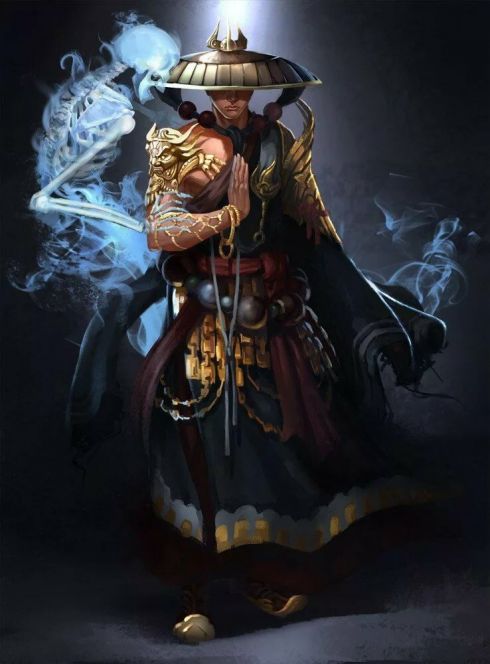Monk Sage Abilities, Studies & Fields
Below can be found a list of the knowledge fields and studies available to the Monk Class. Starting at 1st level, the monk gains one field, and one study within that field. This choice is left entirely to the player.
Contents
There are four fields to choose from:
- Way of the Heart: seeks to embrace the balance of Yin & Yang as a means to empower the body, gaining strength from the energy that surrounds the character. Monks of this way seek interconnectness and interdependence with the natural world.
- Way of the Spirit: seeks to embrace the inward energy that is found in the mind — which, when released, has the capacity to drastically alter the fabric of reality. Thus focus, study and meditation are central to the pursuit of this field.
- Way of the Stick: seeks to strengthen the body as a weapon of war, with the essence of the practitioner being committed to performance in combat, causing damage and acting as an arm for the character's masters — whomever they may be, either good or evil.
- Way of the Stone: seeks to strengthen the body as an immovable, indestructable object, committing the practitioner's essence towards defense. Monks of this way are often guardians of that which must be defended at all costs.
Sage Studies
The studies within these fields are each described more thoroughly on their own pages — and in turn are a number of sage abilities that await possession by player characters and others. Following are a list of studies sorted by their field.
Way of the Heart
- Blood: maintains the body's purity, increasing it's capacity for providing energy to the body, guiding the healing process and the character's will over the body's weaknesses.
- Breath: increases the monk's speed of attack by lessening the body's need for air, or animus.
- Dragon: distracts and confuses the enemy by calling forth the earth's spirit, commonly termed "the dragon," as an ally.
- Yin & Yang: enables numerous combat techniques that surpass the body's limitations by transforming weaknesses into strengths.
Way of the Spirit
- Calligraphy: influences behaviour and happenstance through the use of written characters, transcribed as a form of meditation. Beyond the effects, the characters themselves have importance as communication and providing knowledge of the monk responsible.
- Insight: provides knowledge to the character that would otherwise be unknowable, more in the form of being able to recognise the hidden clues within objects and events rather than acting as a form of divination.
- Mindfulness: the practice of heightened self-awareness, enabling the character to strengthen themselves, withstand supernatural forces and counteract the body's natural impulses towards hunger, the need for sleep, emotional weaknesses and other similar limitations.
- Tranquility: the ability to reach a state of deep meditation, whereby the character achieves a sense of tranquility that can be used to moderate the aggression of others, while seeking a greater understanding of things.
Way of the Stick
- Claw: use of the hooked hand, applied to acts of throwing, catching and speed, while seeking to wound or blind an enemy.
- Fist: use of the closed hand, dedicated towards strength, physical damage and the use of force, seeking to break and destroy an enemy.
- Foot: use of the foot, to provide additional attacks and force in order to overcome an enemy.
- Hand: use of the open hand, to block, stun or misdirect the attacks of an enemy.
Way of the Stone
- Moat: to distance oneself from attack through protections that deny the enemy effectiveness in their attack.
- Pedestal: to take a place and be rooted to it, so as not to yield one foot of ground to an enemy.
- Smoke: to disappear entirely, so as to be where the enemy does not expect.
- Wall: to withstand all that an enemy can deliver, ignoring pain, suffering and damage.
Awarding Knowledge Points
At 1st level, the monk player character will gain 12 knowledge points in their chosen study. A d8-1 is rolled for the other studies in the monk's chosen field, producing a result of 0 to 7 each. A d4-1 is rolled for all other studies in all other fields, producing a result of 0 to 3 each. Therefore, the monk will accumulate sufficient points in every study to most likely become an amateur in all or most studies. Be sure to read the sage abilities page for additional details.
This accumulation is assumed to occur steadily, through everyday discussions with NPCs in settled places, chance reading of books, experiment and insight, whether or not the character ever expresses their intention to gather this knowledge. Time in the campaign is often skirted over ... so we may assume the character spoke to someone in their profession along a road, at a tavern, perhaps finding a shelf of books (and poking through them) during an afternoon's shopping or whenever.
Once the character has gained sufficient levels, the number of both fields and studies are increased. Furthermore, as levels are gained, so are knowledge points, enabling characters to progress from amateur to authority, and thence to expert and sage. At 5th, 9th and 13th levels, the monk will gain a new study in a field that the monk possesses. At 7th and 13th levels, the monk will gain a new field.
